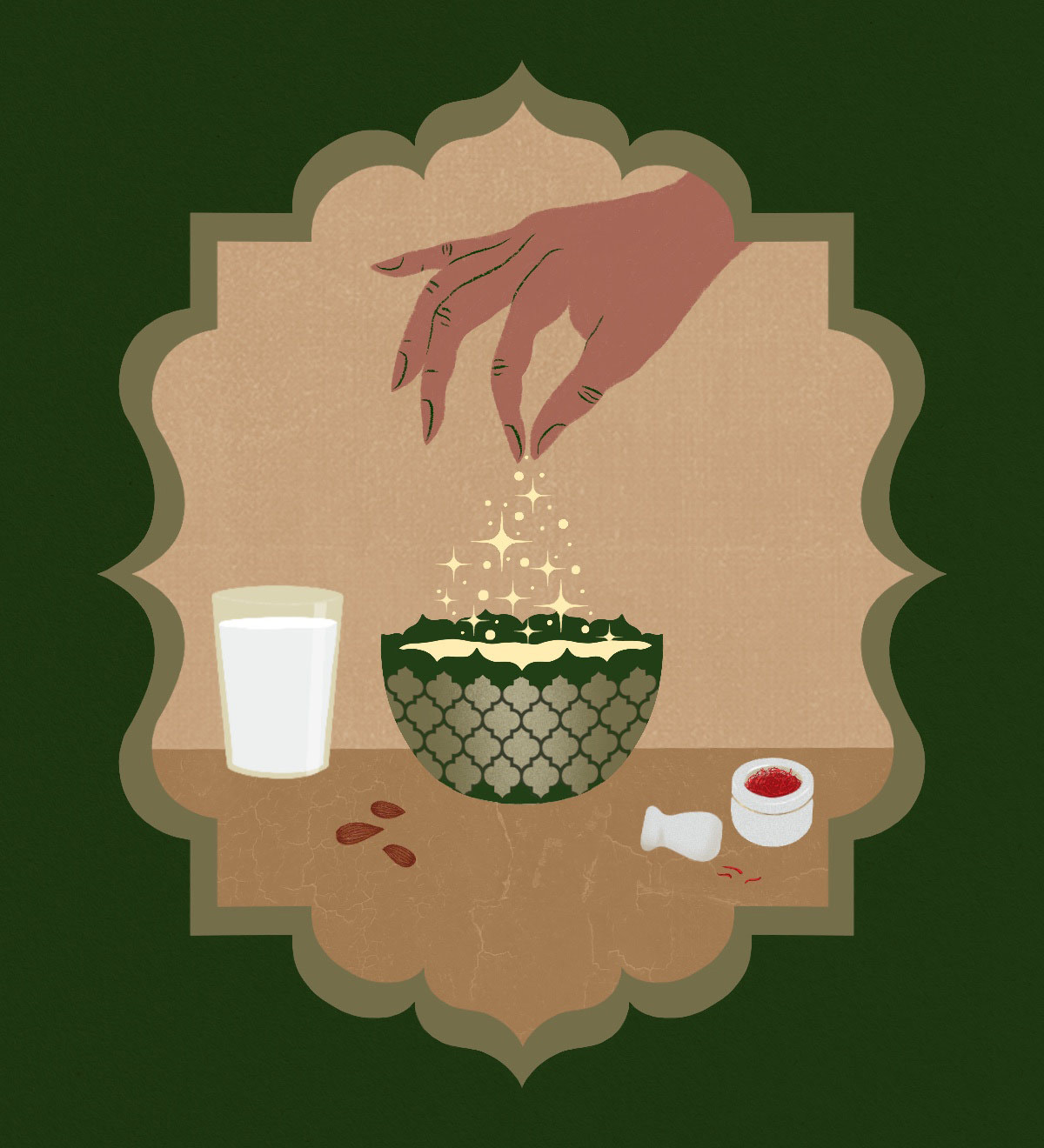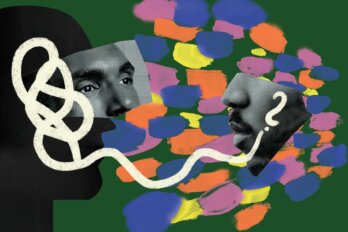Istood in our small hot kitchen in Jeddah, Saudi Arabia, stirring halwa and feeling immensely bored. Halwa is a kind of dessert made with milk powder, flour, sugar, and walnuts. The milk powder, flour, and sugar must be toasted on the stove on low-medium heat for twenty minutes or so until golden-brown, according to how my mom makes it. I was fifteen at the time. My mother had instructed me to keep an eye on the pan while she showered just before our guests arrived for the dawat. My father’s friend and his family were coming over. They’re food aficionados, so naturally everyone in the household was stressed out before the dinner party. Everything, from the menu to the dishes, down to the presentation, had to be impeccable because that’s something that would be talked about in social gatherings for months after.
My mum typically started prepping for the dawat the night before. She’s an award-winning cook who has participated in a number of local food festivals and wants to pass down her culinary skills to her three daughters. She has a great talent for creating a fusion of South Asian and Middle Eastern dishes. She hopes to see the same passion in us—the kind she has, the one she inherited from her mother.
After ten minutes on the gas stove, the milk powder still looked pale. I felt irked. I raised the heat but quickly turned it down again a notch, remembering that that’s how I’d burnt kebabs the last time I was asked to help in the kitchen. Perhaps if I look away, the halwa will cook faster. As they say, “a watched pot never boils.” Who said that? My nani or some old British man? I must look up the origin of this saying. I left to use the computer in the living room for what felt like a minute. Then I heard my mum yelling from the kitchen. To nobody’s surprise, I had burnt the halwa.
While this was an accident, there were other times when I accidentally-on-purpose burnt things: garlic, onion, veggies, you name it. My logic was simple: if I displayed shoddy workmanship, my mum would think twice before asking me to help out in the kitchen. I don’t know what exactly it was that deterred me from cooking. Perhaps the expectation that I should be keen. Keen to cook. Keen to serve.
It wasn’t that I absolutely needed to learn how to cook as a teenager. It was more about cultivating the chops to get around the kitchen when the need arose. It was also about setting an example so my younger sisters would follow suit.
دیکھا ہوا ہو گا تو سب آ جاۓ گا جب اپنی زندگی شروع کرو گی “If you watch me do it, it’ll all come to you once you are settled,” my mum would often say in Urdu—phrasing that felt dubious to me. “Settled” is the Brown code word for marriage. We love talking in euphemisms, and somehow someone decided that you are settled in life only when you get an education, have a husband, learn how to cook—and bonus points if you have kids and your own place—in that order.
Much to my mum’s dismay, I had never shown interest in learning how to cook. Which was worse than being bad at it. Every time my mum expressed frustration with me, I became more stubborn. If I gave in to one thing—in this case, cooking—I’d fall into the vortex: the vortex of the binary where gender is rigid and there is little room for fallacies. Cooking wasn’t for me. Getting settled wasn’t for me. I wasn’t interested in any of it. It was a pipeline to becoming the perfect Pakistani girl.
Igrew up in Saudi Arabia, in a quintessentially middle-class Pakistani household, which means food was one of the most, if not the most, important part of every conversation:
کھانے میں کیا بنا ہے؟ ہم پھر سے آلو گوبھی کیوں کھا رہے ہیں، پچھلے ہفتے ہی تو کھائ تھی؟ لہسن اتنی جلدی کیسے ختم ہو گیا؟ کھانا کب تیار ہو گا؟ What is there to eat? Why are we eating aloo gobi again? Didn’t we eat it just last week? How come we ran out of garlic already? When will dinner be ready?
My dad, who is an emergency physician, would usually come home in the afternoon and take a nap after his laborious shifts of treating people who were brutally injured or on the verge of a cardiac failure. He grew up in a religious family in Pakistan with strict norms and formalities around gender and sexuality. He packed up and brought some of those with him when he immigrated to Saudi Arabia. But he also let go of many of them. My dad is really good at brewing a perfect cup of chai—as important as food in a Brown household. After his sisters visited us in Saudi Arabia one time, the legend of him in the kitchen was circulated on WhatsApp when they returned to Pakistan. He became some kind of hero, akin to men who “babysit” their children.
I was used to my dad making chai for us in the evenings, something he took pride in and was even better at than my mum. This is to say that gender roles were more relaxed around my house compared to, say, my grandparents’ time. Yet, when I visited Pakistan in the summers, I saw some of my uncles barely entering the kitchen, not even to fetch a glass of water for themselves. That was normalized. And when I gently pointed that out to one of my aunts, I was met with scorn masqueraded as concern and comments about how I hadn’t received my “training” yet—another Brown code, for learning how to be a dutiful wife and a culinary connoisseur. Someone even berated my mum for giving her daughters “too much freedom” and not drilling customs into us early on, making my poor mum doubt her parenting. I couldn’t even make the excuse that I didn’t care for cooking because I wanted to focus on my studies and have a career. It might fly with a stay-at-home mother but not with my mum, who was living proof in the eyes of my relatives that a woman can do it all: have a career and get settled.
My mum, who is a gynecologist, would come back after her taxing shifts of consoling patients and witnessing some gruesome deliveries and quickly move on to worrying about cooking, meal prepping, and helping us with our homework. After taking a decade-long break to raise children, going back to the medical profession was tough—that too in a new country where she didn’t speak the dominant language. Her reasons were twofold: she didn’t want to waste her degree, and it was also becoming hard for my dad to single-handedly provide for the household. A second income would be a blessing.
In Saudi Arabia, the majority of our neighbours in the apartment building where we lived were South Asians who had immigrated from Pakistan, India, and Bangladesh. Life was precarious in the oil-rich country, with limited rights for immigrants, so most foreigners stuck together.
I recall people in our neighbourhood admiring my mother for being such an all-rounder: a devoted mother, a compassionate doctor, and a talented cook. It wasn’t common among women in the neighbourhood to work, and so they were in awe of my mum. What they didn’t see was the many Sisyphean battles she had to fight daily.
.مرد کی نوکری نظر آتی ہے. لیکن عورت کی نوکری نظر نہیں آتی “A man’s job is seen, but a woman’s job goes unnoticed,” my mum would say sometimes when feeling salty about the endless tasks on her mental to-do list. Typically, a Pakistani working woman had to pick up the slack at home, with domestic chores and parenting, despite the fact that she was earning a living too. In a sense, that was the duality of equality, and it didn’t always serve women.
During an Eid lunch when I was around eleven years old, I remember my mother had opened up our apartment in Jeddah to the entire building. A young aunty, who lived next door, was sharing an account of her tumultuous childbirth while chopping carrots. There were at least four other aunties with us in the small square kitchen. One of them watched the rice; the other one fried samosas; someone washed the dishes; one of them was telling the kids to stop running around so fast; and my mum stirred the haleem on the stove. They all quickly came to console the young aunty by offering up stories of their own labour. The older women embraced the younger one.
At the other end of the apartment, the men were busy talking politics in the drawing room. In Muslim gatherings, men and women are often segregated in the house, with the men populating the drawing room (usually adjacent to the entrance of the house) while the women shuttle between the kitchen and the living room and the kids just run around the house. Chores are divided in terms of outside and inside. Women are responsible for hashing out the menu, cooking the meals, and setting the table. Men fetch the groceries and entertain the guests.
When you are a preteen, the dichotomy of gender hasn’t yet been projected onto you, and you are free to roam between the reigns of the drawing room and the kitchen—you are granted fluidity.
I was a quiet kid and had little interest in talking to or playing with other children. I liked being a fly on the wall. I was more curious about what was going on in the kitchen, where I could overhear the riveting tales the aunties were sharing.
There was also something paradoxical about the kitchen. In a Brown household, the kitchen is primarily a feminine space—a private space, tucked away—something you could miss if you weren’t looking for it. There was a stark difference between what I was used to and the open-kitchen concept I would see on American TV shows. It is also a safe haven for older and younger women, where they share intimate stories, jokes, drama, trauma, and secrets.
But by virtue of it being a hidden space, sometimes all the labour that goes into cooking also goes unnoticed.
By May 2020, I had been living in Vancouver for almost two years. Many of us were cooped up indoors thanks to the COVID-19 pandemic. Bidet memes trended on Muslim Twitter as toilet paper disappeared from store shelves across Canada.
My father messaged in the family WhatsApp chat that one of his colleagues had caught COVID and had to be quarantined in a hotel. When you are away from home, you feel everything intensely but also dissociate so you can keep going. I was perpetually worried for my parents.
The moon had just been sighted. Eid-al-Fitr was the next day.
I sat in my room wishing friends and family Eid Mubarak on WhatsApp and yearning for an imaginary home that didn’t exist. “Quit brooding,” I told myself. I went into the kitchen and found my two roommates at the table. I suggested we invite our downstairs neighbours over for brunch to celebrate Eid since we were all quarantining together. It was seven of us altogether, and I was the only Muslim in the house, so I explained what the holiday entailed—going for prayers, eating delicious food, dressing up, and exchanging presents. “It’s kind of like Muslim Christmas.” They enthusiastically agreed.
I quickly put my roommates in charge of crafting a banner for Eid, and I ambitiously set out to cook sheer khurma—a festive dessert made with milk, sugar, vermicelli, saffron, evaporated milk, dates, and dried fruit—with the help of my mum’s multiple voice notes and photos of her scribbled handwritten recipe.
It actually turned out well—or at least that’s what everyone said. I self-deprecatingly joked with my friends that they wouldn’t know the difference since it was their first time having sheer khurma. I also made palak paneer and rice. As it was a potluck, people brought an assortment of food items: dumplings and spring rolls, apple walnut feta salad, naan, and chicken tagine. I had initially thought of cooking everything myself, but some days in the pandemic, I was barely able to get out of bed. I’m glad I had asked my friends to contribute because it didn’t have to be all or nothing.
I’m often asked if I felt culture shock when I first moved to Canada, and I never know how to respond—you see, it’s not one dramatic moment at the airport, as they show in the media; it’s an amalgamation of a lot of little moments, which don’t make sense at first.
For one thing, my mum never used measuring spoons and cups in the kitchen. It’s not only my mum but something common among South Asian matriarchs, who have such an intimate knowledge of the art of cooking that they don’t really need to measure ingredients. For most of my life, I thought measuring spoons and cups were things only white people used.
I try to replicate my mum’s techniques and hacks around the kitchen, which, funnily enough, I had picked up subconsciously—in all those years when I was resisting learning. After cooking based on her recipes, I usually send my mum a photo of the finished dish, and she can tell if the onion was sauteed enough or not. I feel her essence in the food whenever I use her dal or koftay recipes, even though they are nowhere as good as hers—and I don’t want them to be. There’s some comfort in knowing that her cooking is the Holy Grail and something I crave and can look forward to.
I have been cooking properly for over five years now, and I would be lying if I said I didn’t struggle. But I’ll also admit that, much to my mother’s pleasure, I don’t despise it. Turns out there is truth in what she said:
دیکھا ہوا ہو گا تو سب آ جاۓ گا جب اپنی زندگی شروع کرو گی “If you watch me do it, it’ll all come to you once you are settled.” Even so, the definition of “settled” is wildly different for me.
In the traditional sense, I’m antithetical to the perfect Pakistani girl. I’m not married, do not have kids, and do not have prospects of owning a place. But there are similarities. I have two college degrees, I’m also self-sufficient in the kitchen, and I actually enjoy cooking for other people—something I have embraced even if my younger rebellious self would raise an eyebrow at it.
I refused to step inside the kitchen as my way of sticking it to the male gaze—without realizing that I was also depriving myself of the solace that cooking brings. I didn’t hate cooking palak paneer—I hated the patriarchy. The latter is detrimental but shouldn’t be conflated with the former, which is delicious.





